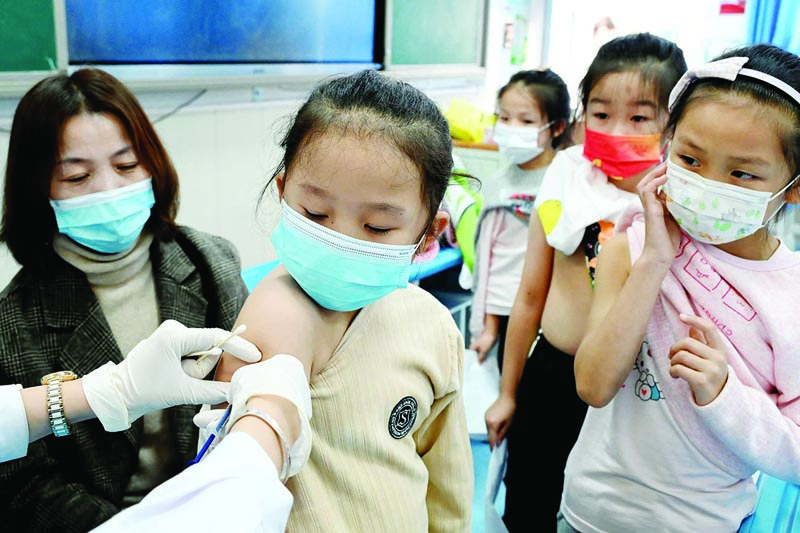 HANDAN: A child receives the COVID-19 coronavirus vaccine at a school in Handan, in China's northern Hebi province yesterday, after the city began vaccinating children between the ages of 3 to 11. - AFP
HANDAN: A child receives the COVID-19 coronavirus vaccine at a school in Handan, in China's northern Hebi province yesterday, after the city began vaccinating children between the ages of 3 to 11. - AFP
GENEVA: The COVID-19 crisis is far from over, the World Health Organization's emergency committee said as it called for research into next-generation vaccines for long-term control of the pandemic. The 19-member committee meets every three months to discuss the pandemic and make recommendations. "While progress has been made through increased uptake of COVID-19 vaccines and therapeutics, analysis of the present situation and forecasting models indicate that the pandemic is far from finished," the WHO said in a statement on four-hour virtual meeting.
The committee called for further research into reusable masks and respirators, and next-generation vaccines, diagnostics and therapeutics "for long-term control of the pandemic". "The use of masks, physical distancing, hand hygiene, and improving ventilation of indoor spaces remain key to reducing transmission of SARS CoV-2," the statement stressed.
The committee said the protracted pandemic was making humanitarian emergencies, mass migration and other crises more complex. States should therefore revise their preparedness and response plans. It raised concerns about Africa's challenges in tackling the pandemic, including access to vaccines, tests and treatments, as well as collecting and analyzing data to monitor the pandemic's evolution.
Just 14 vaccine doses have been administered per 100 people in Africa, according to an AFP calculation. That figure stands at 128 doses in the United States and Canada; 113 in Europe; 106 in Latin America and the Caribbean; 103 in Oceania; 102 in Asia; and 78 in the Middle East. The committee first declared on January 30 last year that the virus was a public health emergency of international concern (PHEIC) - the highest alarm the WHO can sound.
The committee maintained its insistence that proof of vaccination should not be required for international travel or be the only condition for it "given limited global access and inequitable distribution of COVID-19 vaccines". Countries instead should consider a "risk-based approach to the facilitation of international travel by lifting or modifying measures, such as testing and/or quarantine requirements, when appropriate". The committee also called on countries to recognize all vaccines that have been given emergency use approval by the WHO.
Pandemic hit
The impact of the COVID-19 pandemic on jobs has been harder than previously expected, and a worrying two-speed recovery is emerging between richer and poorer nations, the UN's International Labor Organization warned yesterday. "The current trajectory of labor markets is of a stalled recovery, with major downside risks appearing, and a great divergence between developed and developing economies," said ILO chief Guy Ryder.
"Dramatically, unequal vaccine distribution and fiscal capacities are driving these trends, and both need to be addressed urgently." The ILO projected that global hours worked in 2021 will be 4.3 percent lower than levels in the fourth quarter of 2019, prior to the outbreak of the pandemic. That was equivalent to 125 million full-time jobs.
In June, the ILO had been projecting a decline of 3.5 percent, or 100 million full-time jobs. High-income countries fared better, suffering 3.6 percent decline in total hours worked in the third quarter of this year, the ILO calculated. That compares with falls of 5.7 percent for low-income countries and 7.3 percent for lower-middle income countries. By region, Europe and Central Asia experienced the smallest loss of hours worked, and the Arab States the biggest, with the divergence largely driven by major differences in vaccine roll-outs and fiscal stimulus packages, the report said.
The ILO also found that young people, especially young women, have been among the hardest hit by the impact on jobs of the pandemic. The ILO estimates that if low-income countries had better access to vaccines, the working hours recovery would catch up with richer economies in just over one quarter. It estimated that for every 14 people fully vaccinated in the second quarter of this year, one full-time equivalent job was added to the global labor market.
By early October, 59.8 percent of people were fully vaccinated in high-income countries, compared to just 1.6 percent in low-income countries, according to the ILO. Ryder told a press conference that the prospects ahead looked "weak and uncertain", with the fourth quarter of 2021 expected to see only a modest recovery in working hours. Significant downside risks on the horizon include energy prices, inflation and debt distress, while in low- and middle-income countries, fiscal constraints are expected to hinder progress further. - AFP




